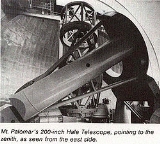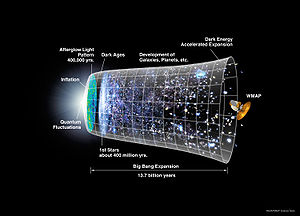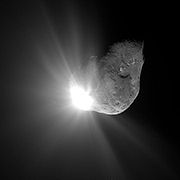
Space science
Encyclopedia
The term space science may mean:
This article describes the third meaning, space science describing all of the various science fields that are concerned with the study of the Universe
, generally also meaning "excluding the Earth" and "outside of the Earth's atmosphere".

See astronomical object
for a list of specific types of entities which scientists study. See Earth's location in the universe
for an orientation.

.jpg)


- The study of issues specifically related to space travelSpace travelSpace travel can refer to:*Spaceflight, the use of space technology to fly a spacecraft into and through outer space, which may include:*Spacefaring, capability of and activity in the art of spaceborn travel.*Human spaceflight...
and space explorationSpace explorationSpace exploration is the use of space technology to explore outer space. Physical exploration of space is conducted both by human spaceflights and by robotic spacecraft....
, including space medicineSpace medicineSpace medicine is the practice of medicine on astronauts in outer space whereas astronautical hygiene is the application of science and technology to the prevention or control of exposure to the hazards that may cause astronaut ill health. Both these sciences work together to ensure that...
. - Science performed in outer space (see space researchSpace researchSpace research is scientific studies carried out using scientific equipment in outer space. It includes the use of space technology for a broad spectrum of research disciplines, including Earth science, materials science, biology, medicine, and physics...
). - The study of everything in outer space; this is sometimes called astronomyAstronomyAstronomy is a natural science that deals with the study of celestial objects and phenomena that originate outside the atmosphere of Earth...
, but more recently astronomy can also be regarded as a division of broader space science, which has grown to include other related fields.
This article describes the third meaning, space science describing all of the various science fields that are concerned with the study of the Universe
Universe
The Universe is commonly defined as the totality of everything that exists, including all matter and energy, the planets, stars, galaxies, and the contents of intergalactic space. Definitions and usage vary and similar terms include the cosmos, the world and nature...
, generally also meaning "excluding the Earth" and "outside of the Earth's atmosphere".
Divisions of space science

By subject
- Stellar astronomy - the study of stars
- Solar astronomySolar astronomySolar astronomy is stellar astronomy of the sun.*Timeline of solar astronomy*Solar telescopes*List of solar telescopes*Coronagraph*Helioseismology-Sun size relative to its distance from Proxima Centauri:...
- the study of our SunSunThe Sun is the star at the center of the Solar System. It is almost perfectly spherical and consists of hot plasma interwoven with magnetic fields...
- Solar astronomy
- Planetary sciencePlanetary sciencePlanetary science is the scientific study of planets , moons, and planetary systems, in particular those of the Solar System and the processes that form them. It studies objects ranging in size from micrometeoroids to gas giants, aiming to determine their composition, dynamics, formation,...
- the study of planets, especially those other than Earth - Galactic astronomyGalactic astronomyGalactic astronomy is the study of our own Milky Way galaxy and all its contents. This is in contrast to extragalactic astronomy, which is the study of everything outside our galaxy, including all other galaxies....
- the study of our Milky Way Galaxy - Extragalactic astronomyExtragalactic astronomyExtragalactic astronomy is the branch of astronomy concerned with objects outside our own Milky Way Galaxy. In other words, it is the study of all astronomical objects which are not covered by galactic astronomy, the next level of galactic astronomy....
- the study of the larger universe beyond the Milky Way - Physical cosmologyPhysical cosmologyPhysical cosmology, as a branch of astronomy, is the study of the largest-scale structures and dynamics of the universe and is concerned with fundamental questions about its formation and evolution. For most of human history, it was a branch of metaphysics and religion...
- the study of the origin, large-scale structure, and space-time relationships of the universe
See astronomical object
Astronomical object
Astronomical objects or celestial objects are naturally occurring physical entities, associations or structures that current science has demonstrated to exist in the observable universe. The term astronomical object is sometimes used interchangeably with astronomical body...
for a list of specific types of entities which scientists study. See Earth's location in the universe
Earth's location in the universe
Knowledge of Earth's location in the universe has been shaped by 400 years of telescopic observations, and has expanded radically in the last century. Initially, Earth was believed to be the center of the universe, which consisted only of those planets visible with the naked eye and an outlying...
for an orientation.
Interdisciplinary fields

.jpg)

- AstrobiologyAstrobiologyAstrobiology is the study of the origin, evolution, distribution, and future of life in the universe. This interdisciplinary field encompasses the search for habitable environments in our Solar System and habitable planets outside our Solar System, the search for evidence of prebiotic chemistry,...
- AstrochemistryAstrochemistryAstrochemistry is the study of the abundance and reactions of chemical elements and molecules in the universe, and their interaction with radiation. The discipline is an overlap of astronomy and chemistry. The word "astrochemistry" may be applied to both the Solar System and the interstellar medium...
or CosmochemistryCosmochemistryCosmochemistry or chemical cosmology is the study of the chemical composition of matter in the universe and the processes that led to those compositions. This is done primarily through the study of the chemical composition of meteorites and other physical samples... - AstrophysicsAstrophysicsAstrophysics is the branch of astronomy that deals with the physics of the universe, including the physical properties of celestial objects, as well as their interactions and behavior...
- the intersection of physicsPhysicsPhysics is a natural science that involves the study of matter and its motion through spacetime, along with related concepts such as energy and force. More broadly, it is the general analysis of nature, conducted in order to understand how the universe behaves.Physics is one of the oldest academic...
and space science, the study of the physics of extraterrestrial objects and interstitial spaces- Space plasma physics
- Orbital mechanics or astrodynamics, which also has applications to spacecraftSpacecraftA spacecraft or spaceship is a craft or machine designed for spaceflight. Spacecraft are used for a variety of purposes, including communications, earth observation, meteorology, navigation, planetary exploration and transportation of humans and cargo....
- Planetary sciencePlanetary sciencePlanetary science is the scientific study of planets , moons, and planetary systems, in particular those of the Solar System and the processes that form them. It studies objects ranging in size from micrometeoroids to gas giants, aiming to determine their composition, dynamics, formation,...
- overlaps with Earth scienceEarth scienceEarth science is an all-embracing term for the sciences related to the planet Earth. It is arguably a special case in planetary science, the Earth being the only known life-bearing planet. There are both reductionist and holistic approaches to Earth sciences...
- Planetary geologyPlanetary geologyPlanetary geology, alternatively known as astrogeology or exogeology, is a planetary science discipline concerned with the geology of the celestial bodies such as the planets and their moons, asteroids, comets, and meteorites...
- Planetary geology
- Micro-g environment research
- Forensic astronomyForensic astronomyForensic astronomy is the use of astronomy – the study of celestial objects – to determine past celestial constellations. This has been used, if relatively rarely, in forensic science and for resolving historical problems more generally, notably issues in art history.-Forensic science:As a...
- Space archaeologySpace archaeologyIn archaeology, space archaeology refers to the study of various human-made items found in space, their interpretation as clues to the adventures mankind has experienced in space, and their preservation as cultural heritage....
- the study of human artifacts in outer space - ArchaeoastronomyArchaeoastronomyArchaeoastronomy is the study of how people in the past "have understood the phenomena in the sky how they used phenomena in the sky and what role the sky played in their cultures." Clive Ruggles argues it is misleading to consider archaeoastronomy to be the study of ancient astronomy, as modern...
- the history of human understanding of the universe - AstronauticsAstronauticsAstronautics, and related astronautical engineering, is the theory and practice of navigation beyond the Earth's atmosphere. In other words, it is the science and technology of space flight....
is the science and engineering of spacefaringSpacefaringTo be spacefaring is to be capable of and active in the art of space travel or space transport, the operation of spacecraft or spaceplanes. It involves a knowledge of a variety of topics and development of specialised skills including : aeronautics; astronautics; programs to train astronauts; space...
and spaceflightSpaceflightSpaceflight is the act of travelling into or through outer space. Spaceflight can occur with spacecraft which may, or may not, have humans on board. Examples of human spaceflight include the Russian Soyuz program, the U.S. Space shuttle program, as well as the ongoing International Space Station...
, a subset of Aerospace engineeringAerospace engineeringAerospace engineering is the primary branch of engineering concerned with the design, construction and science of aircraft and spacecraft. It is divided into two major and overlapping branches: aeronautical engineering and astronautical engineering...
(which includes atmospheric flight)- Aerospace engineeringAerospace engineeringAerospace engineering is the primary branch of engineering concerned with the design, construction and science of aircraft and spacecraft. It is divided into two major and overlapping branches: aeronautical engineering and astronautical engineering...
- Control engineeringControl engineeringControl engineering or Control systems engineering is the engineering discipline that applies control theory to design systems with predictable behaviors...
- Orbital mechanics
- Spacecraft designSpacecraft design- Origin :Spacecraft design was born as a discipline in the 50s and 60s with the advent of American and Russian space exploration programs. Since then it has progressed, although typically less than comparable terrestrial technologies. This is for a large part due to the challenging space...
for launch vehicleLaunch vehicleIn spaceflight, a launch vehicle or carrier rocket is a rocket used to carry a payload from the Earth's surface into outer space. A launch system includes the launch vehicle, the launch pad and other infrastructure....
s and satelliteSatelliteIn the context of spaceflight, a satellite is an object which has been placed into orbit by human endeavour. Such objects are sometimes called artificial satellites to distinguish them from natural satellites such as the Moon....
s - Space environmentSpace environmentSpace environment is a branch of astronautics, aerospace engineering and space physics that seeks to understand and address conditions existing in space that affect the operation of spacecraft...
- study of conditions that affect the operation of spacecraft - Spacecraft propulsionSpacecraft propulsionSpacecraft propulsion is any method used to accelerate spacecraft and artificial satellites. There are many different methods. Each method has drawbacks and advantages, and spacecraft propulsion is an active area of research. However, most spacecraft today are propelled by forcing a gas from the...
- Space foodSpace foodSpace food is food products, specially created and processed for consumption by astronauts in outer space. The food has specific requirements of providing balanced nutrition for the health of individuals working in space, while being easy and safe to store, prepare and consume in the machinery...
- Space logisticsSpace logisticsAccording to the AIAA Space Logistics Technical Committee, space logistics isHowever, this definition in its larger sense includes terrestrial logistics in support of space travel, including any additional "design and development, acquisition, storage, movement, distribution, maintenance,...
- Space medicineSpace medicineSpace medicine is the practice of medicine on astronauts in outer space whereas astronautical hygiene is the application of science and technology to the prevention or control of exposure to the hazards that may cause astronaut ill health. Both these sciences work together to ensure that...
- Aerospace engineering
By approach
- Observational astronomyObservational astronomyObservational astronomy is a division of the astronomical science that is concerned with getting data, in contrast with theoretical astrophysics which is mainly concerned with finding out the measurable implications of physical models...
- ObservatoriesObservatoryAn observatory is a location used for observing terrestrial or celestial events. Astronomy, climatology/meteorology, geology, oceanography and volcanology are examples of disciplines for which observatories have been constructed...
on the ground as well as space observatoriesSpace observatoryA space observatory is any instrument in outer space which is used for observation of distant planets, galaxies, and other outer space objects...
take measurements of celestial entities and phenomena- AstrometryAstrometryAstrometry is the branch of astronomy that involves precise measurements of the positions and movements of stars and other celestial bodies. The information obtained by astrometric measurements provides information on the kinematics and physical origin of our Solar System and our Galaxy, the Milky...
- stuies the position and movements of celestial objects - Amateur astronomyAmateur astronomyAmateur astronomy, also called backyard astronomy and stargazing, is a hobby whose participants enjoy watching the night sky , and the plethora of objects found in it, mainly with portable telescopes and binoculars...
- Astrometry
- Theoretical astronomyTheoretical astronomyBased on strict dictionary definitions, "astronomy" refers to "the study of objects and matter outside the Earth's atmosphere and of their physical and chemical properties" In some cases, as in the introduction of the introductory textbook The Physical Universe by Frank Shu, "astronomy" may be used...
- mathematical modelling of celestial entities and phenomena
Related activities
- Space explorationSpace explorationSpace exploration is the use of space technology to explore outer space. Physical exploration of space is conducted both by human spaceflights and by robotic spacecraft....
- includes scientific investigations through manned spaceflight and space probeSpace probeA robotic spacecraft is a spacecraft with no humans on board, that is usually under telerobotic control. A robotic spacecraft designed to make scientific research measurements is often called a space probe. Many space missions are more suited to telerobotic rather than crewed operation, due to...
s - Space colonizationSpace colonizationSpace colonization is the concept of permanent human habitation outside of Earth. Although hypothetical at the present time, there are many proposals and speculations about the first space colony...
- Commercialization of spaceCommercialization of spaceCommercialization of space is the use of equipment sent into or through outer space to provide goods or services of commercial value, either by a corporation or state. Examples of the commercial use of space include satellite navigation systems, satellite television and satellite radio...
- Space manufacturingSpace manufacturingSpace manufacturing is the production of manufactured goods in an environment outside a planetary atmosphere. Typically this includes conditions of microgravity and hard vacuum.Manufacturing in space has several potential advantages over Earth-based industry....
- Space tourismSpace tourismSpace Tourism is space travel for recreational, leisure or business purposes. A number of startup companies have sprung up in recent years, hoping to create a space tourism industry...
- Space manufacturing
- Space warfareSpace warfareSpace warfare is combat that takes place in outer space, i.e. outside the atmosphere. Space warfare therefore includes ground-to-space warfare, such as attacking satellites from the Earth, as well as space-to-space warfare, such as satellites attacking satellites.It does not include the use of...
- Alien invasionAlien invasionThe alien invasion is a common theme in science fiction stories and film, in which extraterrestrial life invades Earth either to exterminate and supplant human life, enslave it under a colonial system, harvest humans for food, steal the planet's resources, or destroy the planet altogether.The...
- Alien invasion
- Asteroid-impact avoidance
- Space lawSpace lawSpace law is an area of the law that encompasses national and international law governing activities in outer space. International lawyers have been unable to agree on a uniform definition of the term "outer space," although most lawyers agree that outer space generally begins at the lowest...
- Remote sensingRemote sensingRemote sensing is the acquisition of information about an object or phenomenon, without making physical contact with the object. In modern usage, the term generally refers to the use of aerial sensor technologies to detect and classify objects on Earth by means of propagated signals Remote sensing...
- PlanetariumPlanetariumA planetarium is a theatre built primarily for presenting educational and entertaining shows about astronomy and the night sky, or for training in celestial navigation...
- A synthetic observatory, used for education and presentations
See also

- Space Sciences LaboratorySpace Sciences LaboratoryThe Space Sciences Laboratory is an Organized Research Unit of the University of California, Berkeley. It is located in the Berkeley Hills above the university campus...
- University of California, Berkeley
External links
- Space Sciences @ NASA
- Space Sciences @ ESA
- INDIAN INSTITUTE OF SPACE SCIENCE AND TECHNOLOGY
- Space Sciences Institute
- Space Science & Technology, (PersianPersian languagePersian is an Iranian language within the Indo-Iranian branch of the Indo-European languages. It is primarily spoken in Iran, Afghanistan, Tajikistan and countries which historically came under Persian influence...
) an Iranian nongovernmental group who writes scientific articles about Space Science & Technology

